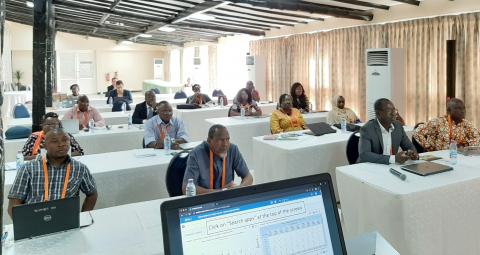Leading the fight against rabies in West Africa through international collaboration and consultation
The fight against rabies in West Africa made new strides towards success when representatives from seven West African countries participated in the latest GARC-WAP stakeholder workshop, under the auspices of the PARACON network. Participants were trained in the latest GARC technologies for surveillance, including brand new and revolutionary components of the Rabies Epidemiological Bulletin. In addition, a focused World Animal Protection (WAP)-led workshop helped focal persons from the representative countries to truly understand the importance of dog population management and the roles of the various parties – including the role of the dog itself.
Participants were selected based on their exemplary commitment towards rabies control efforts in the West African region. Leading countries in surveillance, the GEP courses, the development of a national strategy, and others who have made great strides in their rabies efforts recently were invited to the workshop in Ghana from 26 and 27 November 2019. These countries were Benin, Côte d’Ivoire, Gabon, Ghana, Liberia, Nigeria and Sierra Leone. The workshop aimed to be a short, focused and results-driven workshop to empower these champions with the skills to continue their efforts and foster progress.
Improving surveillance using the latest GARC technologies
The REB has several new components that address critical aspects of rabies surveillance, from case reporting, to vaccination tracking and patient tracking in clinics. Participants first graduated from the REB Level 1 Workshop and became certified REB users. After this, they delved into the various components and entered actual data from their countries. Maps, graphs and tables were automatically updated with this new information - some of which was retrospective data from as far as 5 years back. Current data was also entered and trends, hotspots and areas for intervention could immediately be identified.
You can learn more about the REB and its components by downloading the REB Brochure.
A new perspective on Humane Dog population Management
A specialized humane dog population management (HDPM) workshop was led by World Animal Protection (WAP) where intense and insightful discussions resulted in a breakthrough in terms of DPM for the region. Through unanimous agreement, the dog itself was not identified as the problem, but rather identified to be the victim. Contrarily, the owner of the animal and the community at-large was determined to be the culprit for free-roaming and mismanaged dog populations. The need for community awareness, education and sensitization were identified as critical factors and priority activities towards improving DPM and easing the challenges faced by free-roaming dogs in communities, especially in terms of rabies control and elimination.
You can play a role in raising community awareness and improving education about HDPM and rabies control by becoming a certified rabies educator.
Article contributed by Dr Terence Scott. Technical Lead, Rabies for the Global Alliance for Rabies Control
